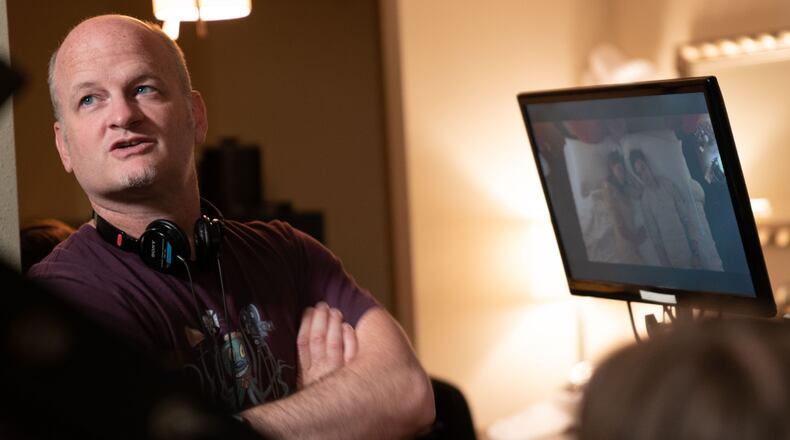Credit: CONTRIBUTED
Credit: CONTRIBUTED
“At the core, these two people struggle with finding love and connecting with others in meaningful ways,” said Wolf, 52. “They each have their different challenges. (Shawn) is an autistic young man who wants to connect with someone and be with someone for the rest of his life, but he has his own challenges socially with connecting and understanding people. (Violet) experienced trauma in her life and is now in a position where she’s being trafficked. They are two people from very different backgrounds who have been hurt a lot and in their relationship they’re able to find unconditional love. (Ultimately) they’re able to know each other and accept each other for who they are and where they are.”
One of the most fascinating aspects of Shawn’s personality – excellently interpreted by Thomas in an endearing feature film debut – is his sensitivity to touch, which heightens the romantic tension. The film also shares similarities with “Pretty Woman” but aims to go deeper in its depiction of sex workers.
Credit: CONTRIBUTED
Credit: CONTRIBUTED
“For dramatic reasons I liked the idea of Shawn being very sensitive to touch and Violet being overly touched,” Wolf explained. “And what I appreciate about ‘Pretty Woman’ is the (treatment) of Julia Roberts’ character (Vivian), which is not overly exploitive. Interestingly they didn’t show a lot of skin, which can be a challenge. There are also parts of that film I wish were more realistic. I found in my research that women who are caught up in prostitution are not there on their own volition. I think Hollywood sometimes likes to pedal a story of a woman being empowered as a sex worker, but it’s not reality (according to) statistics. What I have found is that women who are in that position, nearly 100 percent of the time, have experienced some kind of abuse as children or some other trauma.”
Wright State influences
A 1989 graduate of Kettering Fairmont High School, Wolf says he began making movies while a student at Van Buren Middle School. He recalled attending an event at Wright State University in which he met the late WSU film professor Julia Reichert for the first time. The advice she gave proved very instrumental.
“I was having trouble figuring out how to do credits,” Wolf said. “I was putting individual letters against a black backdrop, which looked very pathetic. Julia explained to me a printing process in which you (ultimately) film the negative. It was eye-opening to me. Julia took me very seriously as a filmmaker in junior high school.”
Credit: CONTRIBUTED
Credit: CONTRIBUTED
After graduation, Wolf studied film at Wright State, gaining insight from Professor Charles Derry’s comedy course centered on such geniuses as Laurel and Hardy.
“I still quote things I learned from that class – it was very influential,” Wolf said. “I transferred to New York University to continue studying film but Wright State really set me up well. I’m super thankful for my Dayton roots. The community has been so supportive and encouraging toward my filmmaking while I was growing up there. Even the Kettering Board of Education loaned me their offices to film there when I was a high school student. Kettering was a very artistically nourishing town to grow up in.”
Based in Los Angeles for over 20 years, Wolf says he enjoyed keeping in touch with Reichert, who passed away Dec. 1 having battled a rare form of terminal cancer. He regards Reichert’s documentaries “American Factory” and “The Last Truck: Closing of a GM Plant” as “remarkable” and was excited to have been invited by her to attend a Los Angeles screening and Q&A of “American Factory.”
Credit: CONTRIBUTED
Credit: CONTRIBUTED
“Julia was a pioneer, especially the lens she looked at the world and the issues she delved into,” said Wolf. “She had such a generous spirit toward other filmmakers. She met you where you were and talked to you as a peer. She had such a unique eye and I would love to emulate that. I would love to be able to use my own unique voice in the way Julia was able to look at the world in her own unique voice. She was very inspiring in that way.”
‘A magical experience’
Wolf made his feature directorial debut, the psychological thriller “In My Sleep,” in 2010. The movie was screened at the Cannes Film Festival and debuted on the Lifetime network in 2015. It will be re-released in a director’s cut in 2023.
Intending to create the most effective adaptation possible, Wolf is pleased to have been able to see his cinematic blueprint for “The Sound of Violet” spring to life so accessibly from the page.
“When most artists write a novel and think about it coming to the screen, they want it to be as close to the original vision as possible,” he said. “This film gave me the opportunity to take things I had imagined inside my head and turn them into reality on the screen. It was a magical experience. It was a joy for me to watch this movie with audiences in theaters who laughed at jokes and situations at the right moments but were also moved by the drama of the story as well.”
As he continues to develop projects, Wolf hopes Hollywood will become more comfortable taking risks on ideas that are outside the mainstream.
“We’re in a place in our culture right now in which studios are not (valuing) different voices,” he said. “It’s really important for filmmakers to be able to nurture and understand their own voice and point of view, but also for people to take risks in the stories they’re telling that might be counter-cultural at the moment. Even for my film, early on, people thought it was going to be offensive because it has an autistic character. But I’m not aware of another movie where an autistic character is the romantic lead and the hero. Let’s be open to stories that allow us to look at the world differently.”
Credit: CONTRIBUTED
Credit: CONTRIBUTED
About the Author






